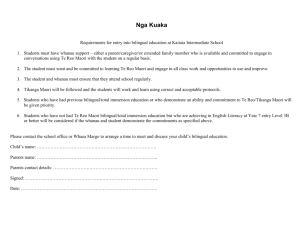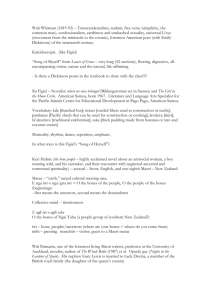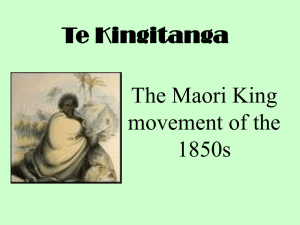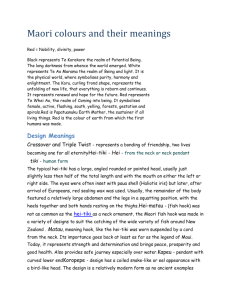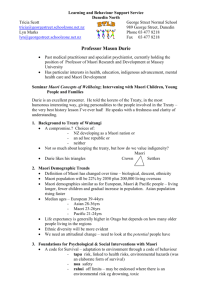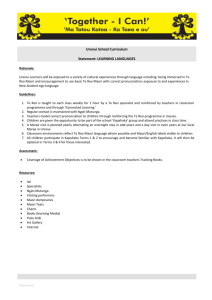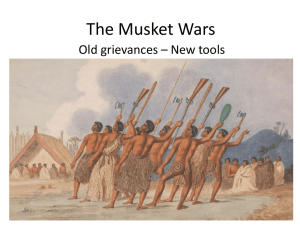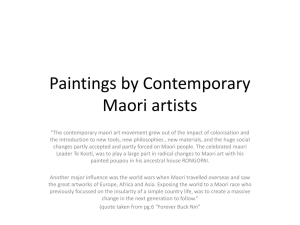The Brash file
advertisement
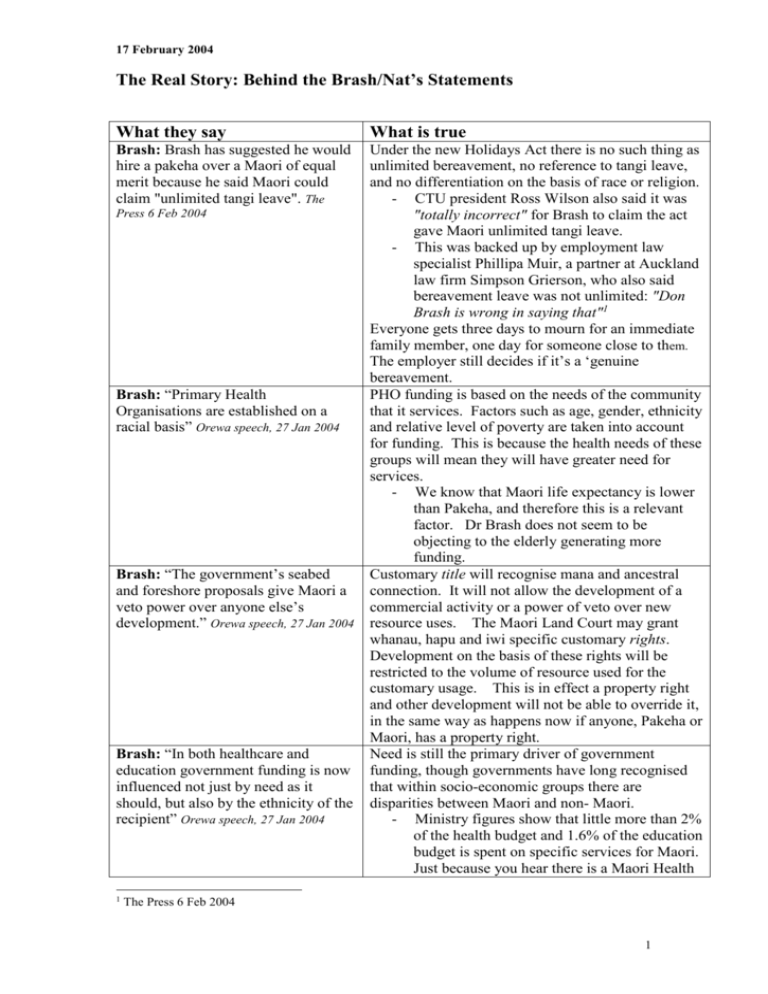
17 February 2004 The Real Story: Behind the Brash/Nat’s Statements What they say What is true Brash: Brash has suggested he would hire a pakeha over a Maori of equal merit because he said Maori could claim "unlimited tangi leave". The Under the new Holidays Act there is no such thing as unlimited bereavement, no reference to tangi leave, and no differentiation on the basis of race or religion. - CTU president Ross Wilson also said it was "totally incorrect" for Brash to claim the act gave Maori unlimited tangi leave. - This was backed up by employment law specialist Phillipa Muir, a partner at Auckland law firm Simpson Grierson, who also said bereavement leave was not unlimited: "Don Brash is wrong in saying that"1 Everyone gets three days to mourn for an immediate family member, one day for someone close to them. The employer still decides if it’s a ‘genuine bereavement. PHO funding is based on the needs of the community that it services. Factors such as age, gender, ethnicity and relative level of poverty are taken into account for funding. This is because the health needs of these groups will mean they will have greater need for services. - We know that Maori life expectancy is lower than Pakeha, and therefore this is a relevant factor. Dr Brash does not seem to be objecting to the elderly generating more funding. Customary title will recognise mana and ancestral connection. It will not allow the development of a commercial activity or a power of veto over new resource uses. The Maori Land Court may grant whanau, hapu and iwi specific customary rights. Development on the basis of these rights will be restricted to the volume of resource used for the customary usage. This is in effect a property right and other development will not be able to override it, in the same way as happens now if anyone, Pakeha or Maori, has a property right. Need is still the primary driver of government funding, though governments have long recognised that within socio-economic groups there are disparities between Maori and non- Maori. - Ministry figures show that little more than 2% of the health budget and 1.6% of the education budget is spent on specific services for Maori. Just because you hear there is a Maori Health Press 6 Feb 2004 Brash: “Primary Health Organisations are established on a racial basis” Orewa speech, 27 Jan 2004 Brash: “The government’s seabed and foreshore proposals give Maori a veto power over anyone else’s development.” Orewa speech, 27 Jan 2004 Brash: “In both healthcare and education government funding is now influenced not just by need as it should, but also by the ethnicity of the recipient” Orewa speech, 27 Jan 2004 1 The Press 6 Feb 2004 1 17 February 2004 Programme does not mean that similar services are not available to the rest of the community. They are. Brash: A Lincoln University research The Foundation for Research, Science and proposal on footrot failed because the Technology strongly rejects claims that research ‘benefits to Maori were not proposals (including sheep footrot) were declined sufficiently made clear.” because ‘ they did not focus enough on Maori.” The Kim Hill TVOne, 4 Feb 2004 proposals did not score as well as many others against the seven assessment criteria FORST statement. Lynda Scott: says it is scandalous Funding for spiritual healing was introduced in 1995 that Counties Manakau DHB is by the National Government: Georgina te Heuheu supporting unproven health practices, “Having health services Mäori people feel such as spiritual healing. RNZ Newswire comfortable using is an important part of addressing 12 Feb 2004 the disparity in health statistics between Mäori and Pakeha. If the availability of traditional Mäori healing clinics encourages people to seek advice early, that is a very good thing for everyone.”2 This has been continued by Labour, along with other services such as Hospital Chaplaincy that take account of those who believe spiritual values add to their well being. Lynda Scott: says that an elderly The Kaupapa Ward was established in 1995 under a Pakeha woman was moved from National Government. Any patient, regardless of Tauranga Hospital’s Kaupapa Ward to their ethnicity, can request to be treated by the make way for a Maori Patient, and kaupapa team, who are trained to offer a service calls this is an example of accommodating Maori cultural perspectives. In this ‘government endorsed racial case the patient who was moved was occupying a separatism’ NZ Herald 13 Feb 2004 spare bed in the ward, and was asked to move when a patient requested to be in the Ward. Brash: “The Nelson-Tasman PHO is There is no requirement that the Nelson-Tasman required to have half of the PHO has to have half its community representatives community representatives on its representing local iwi. The local doctors and other board representing local iwi even providers have determined the make-up of the Board. through the number of people actually There was no government directive and the make up belonging to those local iwi is a tiny of community representation differs from PHO to fraction of the population covered by PHO. that PHO.” Orewa speech, 27 Jan 2004 Brash: The Treaty settlement process Under National three major settlements were has slowed considerably since Labour concluded, along with several very small and nontook office. Orewa speech, 27 Jan 2004 comprehensive settlements. - Under Labour six comprehensive settlements have been reached, two are close to conclusion, four are in the midst of negotiations and others are preparing to enter negotiations. Brash: “National would remove race Nick Smith is already backtracking from this saying based features from legislation” Orewa only some clauses would be removed:“Treaty speech, 27 Jan 2004 references would not be removed from legislation 2 17 /8 /1999 2 17 February 2004 protecting the Maori language and some others which protect aspects of culture, such as those governing the establishment of Te Papa."3 - Brash’s proposal would mean amending Acts dating back to 1908, including over 30 Acts passed under National led governments. Brash: “.. Marlborough Girls College This is the College policy, it’s not the Government’s. had banned the use of necklaces Is Dr Brash really going to dictate the policies of carrying Christian or Jewish symbols every school and university? around the neck but had explicitly said - College policy is that any pupil, Maori or it’s okay for Maori to wear bone Pakeha, can wear a bone carving or carvings etc..” greenstone around their neck as a symbol of RNZ: Nine to Noon, 11Feb 2004 their cultural identity as a New Zealander. Religious symbols can also be worn on a long chain. Brash: said Brownlee was “quite Brash had just appointed Brownlee as their Maori totally inappropriate” in calling John Affairs spokesperson after dropping their only Maori Tamihere a ‘ black fella” Newsroom, 11 MP (Georgina te Heuheu) from the role after she Feb 2004 objected to his ‘separatist’ speech. Brash: "But the plain fact of the The dispute caused little delay to the roading project. matter is that the public of New It resulted in the protection of existing swamplands Zealand has witnessed a parade of and habitats, an excellent environmental outcome. race-based political correctness over Local Maori did not seek, and did not receive, any the past decade or more …..Taniwha payment. stopping roading projects. NZ Herald 16 - Maori must be consulted on proposed road Feb 2004 developments affecting Maori land, land subject to any Maori claims settlement Act, or Maori historical, cultural or spiritual interests. Maori are specified because they are one major group that has not always been consulted concerning the above. 3 NZ Herald 5/2/04 3
